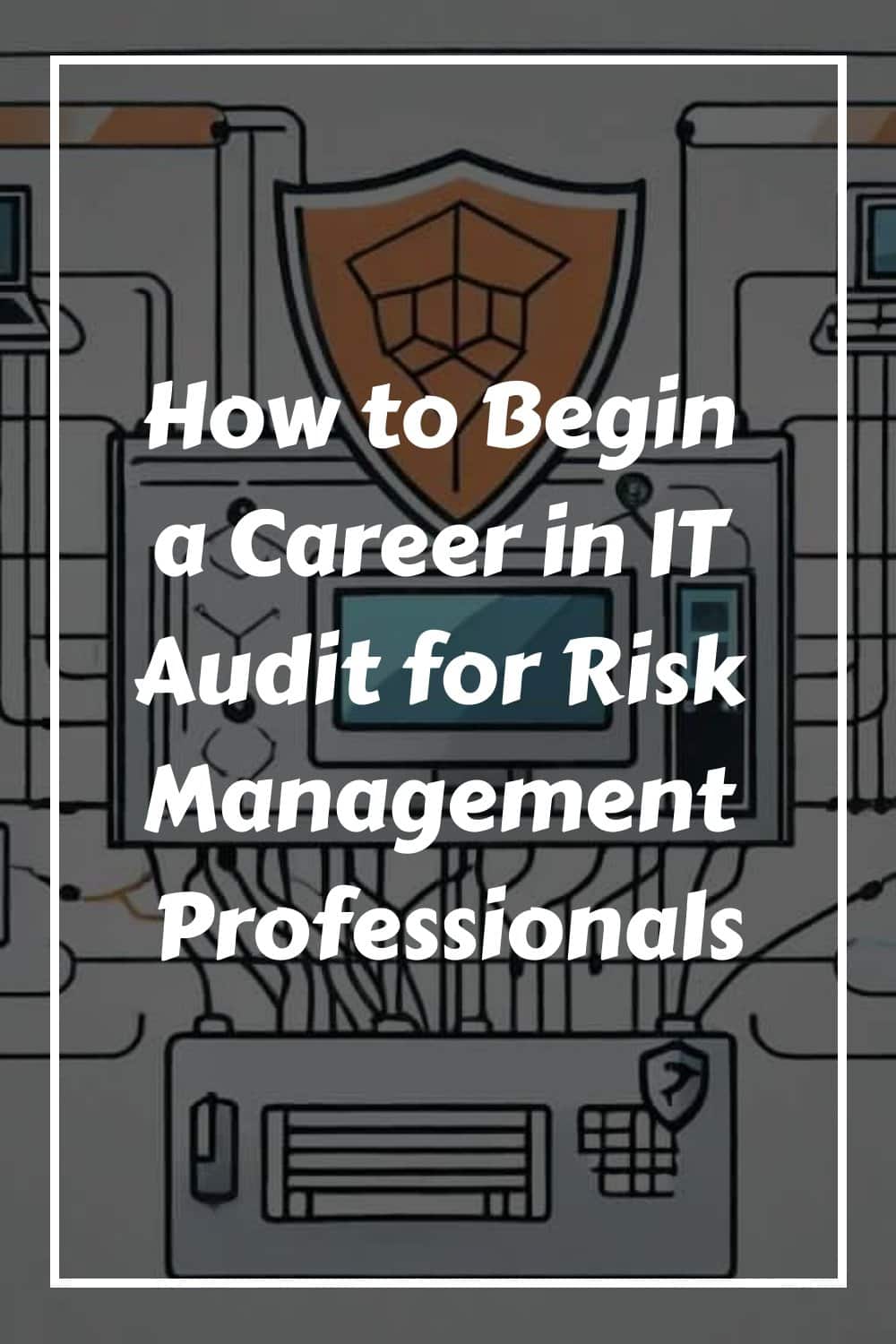
In today’s rapidly evolving digital landscape, the need for robust risk management professionals has never been greater. As organizations strive to safeguard their sensitive data and protect against potential cyber threats, the role of an IT auditor has become increasingly vital. For risk management professionals looking to explore new avenues and broaden their expertise, transitioning into IT audit can be a rewarding and exciting career move. In this article, we will delve into the various aspects of starting a career in IT audit, including the responsibilities of an IT auditor, the required skills, educational requirements, navigating the job market, and potential career growth and advancement opportunities.
Understanding the Role of an IT Auditor in Risk Management
An IT auditor plays a critical role in identifying and assessing the risks associated with an organization’s information technology systems and infrastructure. By conducting thorough audits and assessments, IT auditors help identify vulnerabilities and weaknesses in the organization’s IT environment, allowing for timely remediation and control implementation. Additionally, they ensure compliance with industry regulations and best practices, provide recommendations for improvement, and offer valuable insights to executive management.
To effectively fulfill their responsibilities, IT auditors need to possess a diverse set of skills and knowledge. Let’s take a closer look at some of these key responsibilities:
Key Responsibilities of an IT Auditor
1. Conducting risk assessments: IT auditors are responsible for evaluating the effectiveness of an organization’s internal controls and identifying potential risks and vulnerabilities.
2. Performing audits: IT auditors carry out detailed audits of the organization’s IT systems, processes, and controls to ensure compliance and detect any security gaps or non-compliance issues.
3. Analyzing data and security logs: IT auditors analyze system logs, event logs, and other data sources to identify anomalous activities or potential security breaches.
4. Assessing cybersecurity measures: IT auditors evaluate the effectiveness of an organization’s cybersecurity measures, including firewalls, intrusion detection systems, and security policies.
5. Providing recommendations: Based on their findings, IT auditors provide recommendations and suggest sound strategies for improving the organization’s IT security posture and risk management framework.
6. Collaborating with stakeholders: IT auditors work closely with various stakeholders, including IT teams, management, and external auditors, to ensure a comprehensive understanding of the organization’s IT landscape and to facilitate effective risk mitigation.
7. Staying updated on emerging threats: IT auditors continuously monitor the evolving threat landscape and stay abreast of emerging technologies and trends to identify potential risks and recommend appropriate controls proactively.
8. Conducting training and awareness programs: IT auditors may develop and deliver training programs to educate employees on IT security best practices, policies, and procedures, fostering a culture of security awareness within the organization.
Required Skills for an IT Auditor
To excel as an IT auditor, certain skills and qualities are essential. Here are some key skills and attributes that are highly beneficial:
- Strong technical acumen: IT auditors must possess a solid understanding of various IT systems, networks, cybersecurity principles, and industry best practices.
- Analytical thinking: The ability to analyze complex data, identify patterns, and draw meaningful insights is crucial for IT auditors.
- Attention to detail: IT auditors must be meticulous and have a keen eye for detail to identify potential security vulnerabilities or control gaps.
- Effective communication: IT auditors should possess excellent oral and written communication skills to convey their findings and recommendations to non-technical stakeholders effectively.
- Adequate business knowledge: IT auditors need to understand the organization’s industry, its business processes, and associated risks.
- Certifications: Obtaining relevant certifications, such as Certified Information Systems Auditor (CISA) or Certified Information Systems Security Professional (CISSP), can demonstrate expertise and professionalism in the field.
- Problem-solving skills: IT auditors need to be adept at solving complex problems and making decisions in high-pressure situations.
- Collaboration and teamwork: IT auditors often work as part of a team, collaborating with colleagues to achieve common goals and objectives.
- Adaptability: Given the ever-changing nature of technology and cybersecurity, IT auditors must be adaptable and willing to learn and update their skills continuously.
Transitioning from Risk Management to IT Audit
If you’re already a risk management professional looking to transition into IT audit, rest assured that your existing skills and experience can be highly valuable in this new domain. Here are some important steps to smooth your transition:
Identifying Transferable Skills
Start by identifying the transferable skills you’ve acquired in risk management that can be applied to IT audits. Risk assessment, data analysis, compliance, and project management skills can be highly relevant in an IT audit role. These skills are crucial in understanding and evaluating the potential risks and vulnerabilities within an organization’s IT infrastructure.
For example, your experience in risk assessment can help you identify and prioritize potential IT risks. At the same time, your expertise in data analysis can assist in examining large datasets to uncover any irregularities or anomalies. Furthermore, your knowledge of compliance regulations can ensure that the organization adheres to relevant laws and industry standards.
Project management skills are also essential in IT audits, as you will be responsible for planning and executing audits, coordinating with various stakeholders, and ensuring the timely completion of audit tasks. Your ability to manage resources, meet deadlines, and communicate effectively will contribute to the success of IT audit projects.
Gaining Necessary IT Audit Knowledge
To bridge the knowledge gap in IT audit, it’s crucial to understand IT systems, cybersecurity, and auditing principles. While your risk management background provides a solid foundation, expanding your knowledge in these areas will enhance your credibility and effectiveness as an IT auditor.
Consider enrolling in courses or obtaining certifications that provide comprehensive coverage of IT auditing concepts. These programs often cover topics such as IT governance, IT risk management, network security, and data privacy. By gaining a deeper understanding of these subjects, you’ll be better equipped to assess the effectiveness of an organization’s IT controls and identify potential vulnerabilities.
Self-study and online resources can also be valuable in gaining knowledge and staying updated with industry trends. Engage in continuous learning by reading books, articles, and research papers related to IT audits. Participate in webinars, online forums, and professional networking events to connect with experienced IT auditors and gain insights into their best practices and strategies.
Additionally, consider seeking opportunities to apply your newfound knowledge in practical settings. This could involve volunteering for IT audit projects within your current organization or taking on freelance IT audit assignments. Practical experience will strengthen your skills and provide tangible examples to showcase during job interviews.
By leveraging your transferable skills and acquiring the necessary IT audit knowledge, you can successfully transition from risk management to IT audit. Embrace the learning process, stay curious, and continuously seek opportunities to grow in this exciting field.
Educational Requirements for IT Auditors
While educational requirements may vary, a strong educational background in relevant fields can significantly enhance your prospects as an IT auditor. Here are some educational considerations to keep in mind:
When it comes to pursuing a career as an IT auditor, having the right educational qualifications can make a world of difference. Many organizations prefer candidates with a bachelor’s or master’s degree in fields such as information systems, computer science, accounting, or business administration. These degrees provide a solid foundation in the technical and analytical skills required for the role.
However, it’s not just about having a degree. In today’s competitive job market, obtaining relevant certifications can further boost your credibility and demonstrate your commitment to professional development. Certifications such as Certified Information Systems Auditor (CISA) or Certified Information Systems Security Professional (CISSP) are highly regarded in the industry and can give you an edge over other candidates.
Relevant Degrees and Certifications
Many organizations prefer candidates with a bachelor’s or master’s degree in fields such as information systems, computer science, accounting, or business administration. These degrees provide a solid foundation in the technical and analytical skills required for the role. For example, a degree in information systems equips you with the knowledge of how information is processed, stored, and transmitted within an organization. On the other hand, a degree in accounting or business administration can provide you with a strong understanding of financial systems and controls.
Additionally, obtaining relevant certifications, such as CISA or CISSP, can further boost your credibility and demonstrate your commitment to professional development. These certifications validate your expertise in areas such as information systems auditing, control, assurance, and security. They require passing rigorous exams and often require ongoing continuing education to maintain the certification.
Continuing Education for IT Auditors
Continuous learning and professional development are crucial in the field of IT audit. As technology advances rapidly, IT auditors need to stay abreast of emerging threats, evolving regulations, and new audit techniques. Participating in relevant training programs, attending conferences, and pursuing advanced certifications can keep your skills up to date and demonstrate your commitment to excellence.
IT auditors must constantly adapt to the ever-changing landscape of technology and cybersecurity. Attending industry conferences and workshops can provide valuable insights into the latest trends and best practices. These events often feature expert speakers who share their knowledge and experiences, giving you a deeper understanding of the challenges and opportunities in the field.
In addition to attending conferences, pursuing advanced certifications can also help you stay ahead of the curve. Certifications such as Certified Information Systems Auditor (CISA), Certified Information Systems Security Professional (CISSP), or Certified in Risk and Information Systems Control (CRISC) demonstrate your expertise in specific areas of IT audit and can open doors to new career opportunities.
Furthermore, continuous learning through online courses, webinars, and self-study can help you develop specialized skills and stay updated on the latest industry standards and regulations. Platforms like Coursera, Udemy, and LinkedIn Learning offer a wide range of IT audit-related courses that you can take at your own pace, allowing you to expand your knowledge and enhance your professional growth.
In conclusion, while educational requirements for IT auditors may vary, having a strong educational background and pursuing continuous learning opportunities can greatly enhance your prospects in this field. Obtaining relevant degrees and certifications and actively participating in professional development activities showcase your commitment to excellence and position you as a valuable asset in the ever-evolving world of IT audit.
Navigating the IT Audit Job Market
The demand for skilled IT auditors is on the rise, with organizations recognizing the importance of robust cybersecurity and risk management practices. As technology continues to advance, the need for professionals who can assess and mitigate IT-related risks becomes increasingly crucial. To navigate the job market successfully and land your first IT audit job, consider the following strategies:
Understanding the Demand for IT Auditors
Researching the market is a crucial first step in understanding the demand for IT auditors in your desired location. By delving into the current job market trends, you can identify industries and sectors where IT audit roles are in high demand. This knowledge can significantly increase your chances of finding suitable employment opportunities. For example, the banking and finance sectors often demand IT auditors due to the sensitive nature of financial data and the need for stringent cybersecurity measures.
Furthermore, staying up to date with emerging technologies and their impact on the IT audit field is essential. As organizations adopt new technologies, such as cloud computing or artificial intelligence, the demand for IT auditors with expertise in these areas may increase.
Tips for Landing Your First IT Audit Job
1. Tailor Your Resume: When applying for IT audit positions, it is crucial to customize your resume to highlight relevant skills, certifications, and experiences that demonstrate your suitability for the role. Emphasize your knowledge of IT controls, risk assessment methodologies, and any experience with auditing frameworks such as COBIT or ISO 27001.
2. Networking: Building a strong professional network can significantly enhance your chances of landing an IT audit job. Attend industry events, such as conferences or seminars, where you can meet professionals already working in the field. Joining relevant professional associations, such as the Information Systems Audit and Control Association (ISACA), can also provide valuable networking opportunities and access to job boards specifically tailored to IT audit roles.
3. Gain Experience: While landing your dream IT audit job right away may be challenging, consider internships or entry-level positions that offer exposure to IT audit. Even if the role is not exactly what you envisioned, it can provide valuable experience and help you build a foundation for your career in IT audit. Volunteering for IT audit projects within your current organization can also showcase your dedication and willingness to learn.
4. Continuous Learning: The field of IT audit is constantly evolving, with new technologies and cybersecurity threats emerging regularly. To stand out as a candidate, showcase your commitment to continuous learning by participating in relevant training programs and obtaining certifications. Certifications such as Certified Information Systems Auditor (CISA) or Certified Information Systems Security Professional (CISSP) can demonstrate your expertise and dedication to the field.
By understanding the demand for IT auditors, tailoring your resume, networking, gaining experience, and continuously learning, you can position yourself as a strong candidate in the competitive IT audit job market. Remember, landing your first IT audit job may require persistence and patience, but with the right strategies, you can achieve your career goals in this exciting and ever-growing field.
Career Growth and Advancement in IT Audit
The field of IT audit offers ample opportunities for career growth and advancement, providing a promising career path for professionals with the right skills and motivation. Let’s explore some potential career paths for IT auditors:
Potential Career Paths for IT Auditors
As an IT auditor, you have the potential to progress in your career and take on more challenging roles. Here are some potential career paths that you can consider:
- Senior IT Auditor: As you gain experience and expertise in the field, you can progress to senior IT auditor roles. In these positions, you will lead audits, mentor junior auditors, and have more responsibility in decision-making. This role allows you to showcase your leadership skills and contribute to the growth of the audit team.
- IT Audit Manager: A managerial role in IT audit involves overseeing a team of auditors, managing audit projects, and collaborating with senior management to develop audit strategies. As an IT audit manager, you will have the opportunity to shape the direction of the audit function and drive continuous improvement.
- IT Risk Manager: With a solid understanding of IT risks and controls, you can explore roles in IT risk management. In these positions, you will proactively identify and mitigate risks, develop risk management frameworks, and ensure the organization’s compliance with regulations.
- Chief Information Security Officer (CISO): For IT auditors with a passion for cybersecurity, the role of a CISO can be a viable career progression. As a CISO, you will develop and implement comprehensive cybersecurity strategies and ensure the organization’s overall security posture.
Strategies for Career Advancement in IT Audit
To advance in your IT audit career and seize the opportunities available, consider the following strategies:
- Continued Professional Development: Stay updated with the latest industry trends, regulations, and emerging technologies through continuous learning and professional development activities. Attend relevant training programs, webinars, and conferences to enhance your knowledge and skills.
- Expand Your Knowledge: Seek opportunities to expand your knowledge and expertise in areas such as cybersecurity, data analytics, or emerging audit methodologies. Acquiring additional certifications, such as Certified Information Systems Auditor (CISA) or Certified Information Security Manager (CISM), can also enhance your credibility and open doors to new career opportunities.
- Build a Professional Network: Develop relationships with professionals in the IT audit field through networking events, industry conferences, and online forums. Join professional associations and participate in their activities to connect with like-minded individuals, share knowledge, and stay informed about job openings and industry trends.
- Seek Mentorship: Find mentors who can provide guidance, share their experiences, and support your career growth in IT audit. A mentor can offer valuable insights, help you navigate challenges, and provide advice on how to achieve your career goals.
- Contribute to the Profession: Contribute to the advancement of the IT audit profession by publishing articles, presenting at conferences, or participating in professional associations. Sharing your knowledge and experiences helps others in the field and enhances your professional reputation and visibility.
Starting a career in IT audit as a risk management professional can open up new doors of opportunity and allow you to make a meaningful impact in today’s evolving digital landscape. By acquiring the necessary skills, education, and experience and leveraging your existing expertise, you can embark on a rewarding journey toward a successful career in IT audit.








